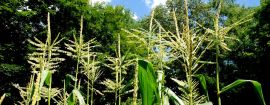In the above photo the right hand tomato was from a Terra Fresh treated plant, but it was picked a but later than the redder one on the left.
If you read much online gardening social media, you probably were bombarded with ads for Terra Fresh. This product claims to prevent tomato diseases and increase you yields of tomatoes by as much as a factor of two.
The selling on the website is very aggressive: once you access the site, it makes it hard to leave because of “Wait, don’t go” pop-ups. The first thing they show you is “Lifelong Gardener” Lex Case. He tells you that this is an “All natural blend of plant extracts that wildly increases the microbial population around your plant.” Other places, they refer to these as “phytochemicals,” which also means “plant extracts.“ Whatever you do, don’t click on “CC,” the closed caption options, because it appears to be nonsense from another plane; “…Express love with me in breathe easy social operation…”
Other than that you can’t look anywhere for more information, because terrafreshhome.com has only one main page and no menu. You can, of course order bottles of Terra Fresh, but there is no more information about what the bottles contain.
The ingredients are not “organic,” (which is only a marketing term) but are “all Natural (which doesn’t mean anything either.)
A single 16oz bottle costs $29.95, but there seem to be discounts of 10% you can apply. If you try to order just 1, you’ll get an Email urging you to order at least 3.
We bought just one. You get a 16oz bottle with about 1 oz of brown liquid in it, to which you add 15 oz of “purified water,” whatever that means. Then for each plant, you dissolve ¼ tsp of this solution in 1 pint of water and pour it around the roots. They suggest every 2-3 weeks: we actually did it more like once a week.
We planted 14 tomato plants in our garden this year, and among them were 3 Amish Paste tomatoes, grafted to stronger stems to make them more disease resistant, and sold by Totally Tomatoes or Vermont Bean Seed (these are the same company). We decided to treat one of the three Amish Paste plants. We also grew 3 large tomato plants of the variety “BW,” produced by Prof Harry Klee’s lab at the University for Florida. His group has developed tomato varieties with excellent flavor, based on extensive consumer panel testing. We also treated one of the BW plants with one pint of the Terra Fresh solution weekly.
Tomato diseases
We followed instructions from several gardening experts, and removed the bottom leaves from each plant, and any that would touch the ground. Since the season was so dry, we saw no evidence of early or late blight on any plants, but of course Septoria Leaf Spot showed up about the time the plants set fruit. Treatment with Daconil helped somewhat, but we mostly just removed each leaf the developed spots as soon as we “spotted” it. The first plant to develop leaf spot was #4, which in fact was one being treated with Terra Fresh.
Harvest
This was a difficult season for gardening in Connecticut because we had a very dry summer, with only about 0.5 inches of rain in August, which slowed down ripening. In addition, even though our garden plot is fortified on all sides, including roof netting, thirsty raccoons began attacking the plants in late August. It is now the last week of September, and while there are still plenty of green tomatoes on most plants, ripening is much slower., as we decided to cut off the experiment in report the results.
Amish Paste
For the Amish Paste tomatoes our 3 plants had the following yields:
- Amish #2 – 17 tomatoes, 125 oz
- Amish #4 – 13 tomatoes, 77.5 oz *
- Amish #6 – 10 tomatoes, 71 oz.
The plant marked with the asterisk(*) was treated with Terra Fresh and was far from the winner.
BW large tomatoes
- BW #1 – 11 tomatoes, 136 oz
- BW #13 – 9 tomatoes, 114 oz *
- BW #12 – 4 tomatoes, 40.6 oz (partial shade)
Again, the Terra Fresh plant(*) was not the winner, but somewhat closer to the winner than the Amish Paste plant was.
So despite Lex Case’s extensive and aggressive advertising, this product doesn’t seem to do much positive. It may actually have retarded the growth a bit.
And finally, among the paragraphs of nonsense on their sell-page, you will find:
One of our founders lost his son to cancer a few years ago. We are convinced that he got sick to begin with due to the chemicals we are bombarded with every day. We started Terra Fresh to be a part of the solution to that problem.
Terra Fresh
This is an appeal to emotion and gullibility, since he never identifies any actual causality in the unfortunate young man. It is just nonsense, much that we may feel for the unnamed “founder.”
So we still have most of the bottle if someone wants it. We don’t think the experimental results were very positive, though.



